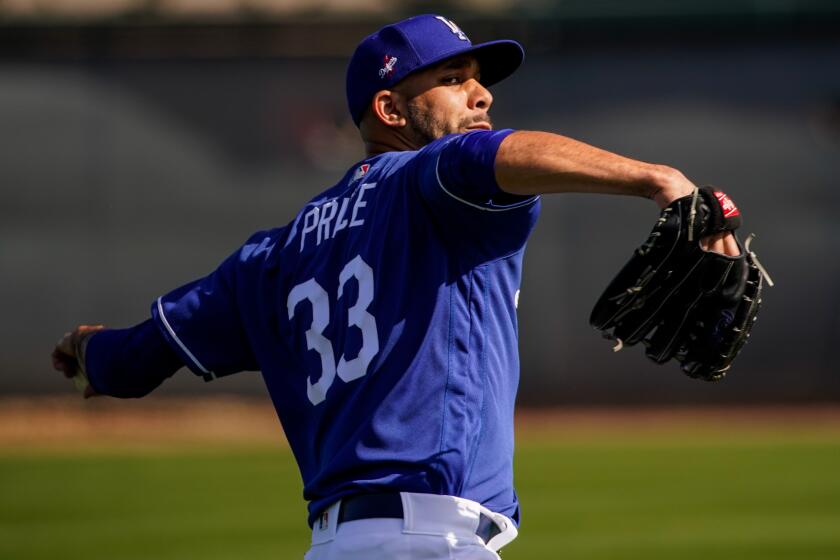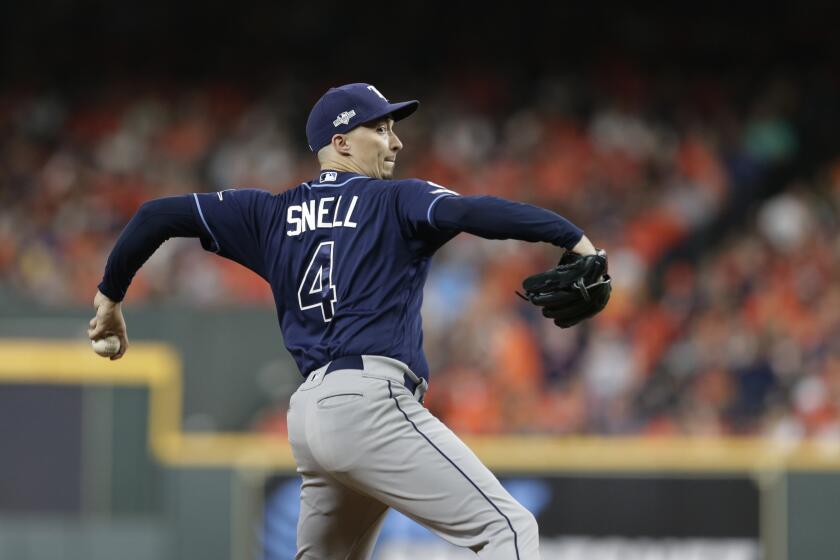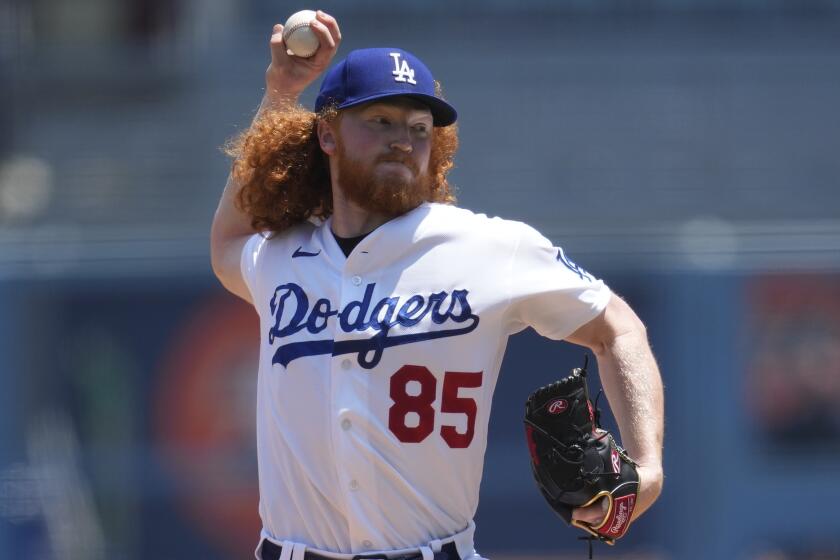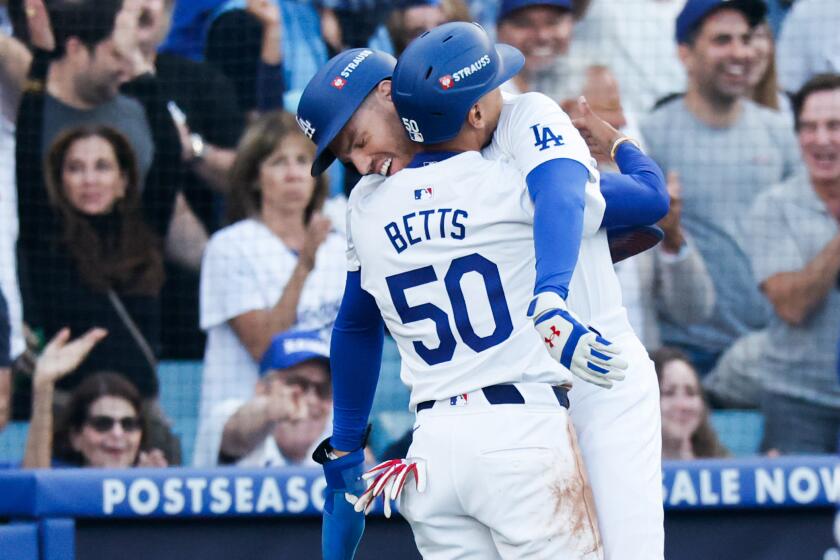Column: Jordan Lorenz, the Dodgers’ lead groundskeeper, is ready to have a field day
By normal standards, the activity at Dodger Stadium is slow.
A player might come in to take batting practice. Another might run the bases. Or maybe a pitcher will throw in the bullpen.
This isn’t a game, Jordan Lorenz figures, but it’s something.
“At least there’s some baseball activity going on,” Lorenz said in a phone interview. “It feels like we’re getting a little closer to something happening.”
As the team’s director of turf and grounds, Lorenz is the primary caretaker of the most famous lawn in Los Angeles.
Lorenz is in his 16th year as a Dodgers groundskeeper, his fourth as the person in charge. Like pretty much everyone else in the game, the 39-year-old has learned to use the baseball season to measure time.
By now, the calm of the winter would have transformed into something more hectic, that part of the year when he devotes 12 to 14 hours of each day repairing a playing surface that was damaged by the most recent game.
Except this year, the clock was stopped. The coronavirus outbreak indefinitely pushed back opening day, leaving Lorenz stuck where he was two months ago, with a usable field but no games to be played on it.
So he waits.
Lorenz and the team’s three other full-time groundskeepers still report to their outdoor office every weekday, entering the field level gates behind the visitor’s bullpen at around 7 a.m. As long as the possibility of a 2020 season remains in play, they will continue to fertilize hope.
Recently acquired pitcher David Price said he will donate $1,000 to 221 Dodgers minor leaguers in June to help make ends meet in the absence of a season.
“We want baseball just as much as anybody,” Lorenz said. “We’re doing all we can to keep everything in as good shape as possible.”
He’s done this for the majority of his life. When he was in high school, he and his friends used to maintain the baseball and softball fields around their hometown of Mitchell, S.D. Lorenz went to South Dakota State thinking he would be an engineer but shifted his focus to horticulture with the intent of becoming a golf course superintendent.
An internship with the Milwaukee Brewers opened his mind to other possibilities.
“It was pretty eye-opening to see what it actually takes to maintain a baseball field at the major league level,” Lorenz said. “I knew I wanted to, if possible, stay in this world.”
The Dodgers offered him the opportunity, in 2005.
When longtime head groundskeeper Eric Hansen retired after the 2016 season, Lorenz replaced him as the leader of an experienced crew that includes fellow full-timers Justin Patenaude, Frank Torres and Ryan Cowan.
While the NBA and NHL take steps to resume, MLB is arguing with its players over money. Baseball will lose a great deal if no season is played.
The group maintains Dodger Stadium’s Bermuda grass surface, which is well-adapted to Chavez Ravine’s microclimate.
“It’s pretty much perfect for playing baseball in Southern California,” Lorenz said. “It’s what they call a warm-season grass. It likes it when it’s hot. It recovers from damage really quickly. It makes a good consistent surface that can be pretty smooth to play on. In Milwaukee, they couldn’t grow Bermuda grass because it doesn’t get warm enough and it needs a lot of sun, whereas we would have a tough time growing bluegrass, which a lot of the East Coast and the northern teams have because it doesn’t do very well when it gets hot.”
With decades of collective experience — Torres has been a Dodgers groundskeeper since the early 1990s — Lorenz’s crew can make the turf look and feel like carpet.
Lorenz chuckled as he spoke about how fans on stadium tours often ask him and his partners whether the surface is artificial.
“We take it as a compliment,” he said.
The groundskeepers’ major task of the offseason was to replace the grass and improve the drainage in the bullpen, which was affected by the construction project in the outfield pavilion. Otherwise, the absence of games has made the work considerably less taxing. That includes the commute. Lorenz lives in Fullerton. In previous years, when the Dodgers weren’t playing home games, he often commuted to the stadium by train. He can now make the drive from his residence in about 30 minutes.
But Lorenz also misses normalcy. Social distancing measures force him to stay away from his co-workers. And there’s also the responsibility of preparing the field for games that could be watched by thousands, if not millions.
“One of the worst things that we can see, and it’s very obvious to anybody else that’s watching the game, is a bad hop,” he said. “That’s one of the worst things for us because that’s the field affecting how the game is going.
Letters from readers to the Los Angeles Times sports department.
“There’s times it’s pretty nerve-wracking because you’re dealing with a living organism. There’s a lot of eyeballs on the games and it’s really important for us when everything goes off perfectly.”
If the negotiations between the league and union manage to salvage the season, Lorenz could be only a few weeks from feeling that weight again, especially if the Dodgers decide to stage spring training at Dodger Stadium.
But it’s a good kind of nervousness, a sensation Lorenz would welcome.
More to Read
Are you a true-blue fan?
Get our Dodgers Dugout newsletter for insights, news and much more.
You may occasionally receive promotional content from the Los Angeles Times.












